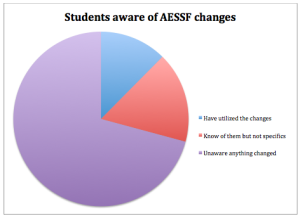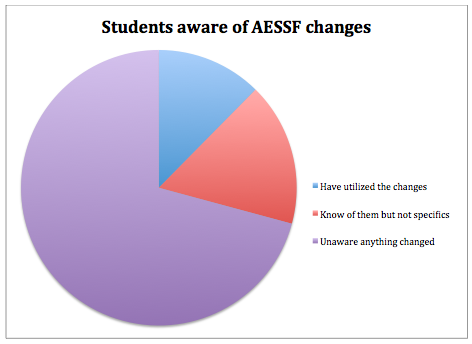By Katlin Sweeney
Editor-in-Chief
Students are demanding more information on where their money is going as tuition prices increase due to a fee that passed late last year.
The Academic Excellence and Student Success Fee, which passed on June 18, 2013, increases the amount of money that students have to pay in order to attend CSUSM. According  to Executive Order 1086, Chancellor White stated that the AESSF will raise fees to $150 in the 2014-15 year, to $200 in the 2015-16 year and to $250 in the 2016-17 year. After spring 2017, the $250 amount will be the permanent number that students can expect to be charged per year.
to Executive Order 1086, Chancellor White stated that the AESSF will raise fees to $150 in the 2014-15 year, to $200 in the 2015-16 year and to $250 in the 2016-17 year. After spring 2017, the $250 amount will be the permanent number that students can expect to be charged per year.
Students began paying the increase in tuition during fall registration, the fee being an extra $50 per semester. According to Executive Order 1086, the fee will be used for “reducing time to graduation, expanded library hours and resources and academic student support.” The goal is that students are able to graduate sooner because of more classes being created to deal with impacted courses. It cannot go towards paying or increasing general CSUSM employee salaries, paying for travel costs or replacing hardware/software that is used by faculty and administrators. It also cannot be used for projects that do not directly relate to what the goals of the fee are.
While some students know that the AESSF was passed and is already showing up in their tuition costs, many are completely unaware. Of the approximately 11,000 students attending CSUSM this semester, The Cougar Chronicle interviewed 1% of the student body to gain some insight as to what students think about the AESSF.
113 CSUSM students anonymously filled out either a print or digital six-question survey. Questions ranged from to what extent students knew about the fee to whether they felt the change was positive or not. The 79 participants that filled out the print version had the opportunity to provide a personal statement about the AESSF as well. 31 students chose to write their opinion down, six participants writing a positive comment and 25 writing a negative one.
The survey results showed that students were indifferent, unfamiliar with or unhappy with the changes made due to the AESSF.
When asked if they were familiar with what the AESSF was, 57 students answered yes, but only 24 of them knew what it was used for. 56 of the 113 students stated that they had never even heard the term before. When they were asked if they were in favor of the AESSF passing, 11 students answered yes, 23 said no, 14 chose not to answer and 65 stated that they were indifferent.
“The survey they provided online for our feedback did not allow you to say why you would not want the fee. It was skewed with only positives,” one student wrote.
“Students are already struggling to pay for school. Now the university came up with an attractive sounding ‘politically correct’ name for another cost to make people have a positive feeling about paying for school due to it being named the ‘student success’ fee,” another student anonymously wrote.
Out of the 33 students that knew changes had occurred on campus, only 14 knew what they were and had utilized them. Many of these students cited that the only thing they knew about the AESSF was that it extended library hours, having learned this from the posters around campus advertising them. 80 participants stated that they were not aware that any changes had taken place. All of the students that chose to write positive responses cited the library hours as a beneficial change.
“I like how the library is open later hours though. We need to work towards 24/7 library hours,” one student anonymously answered.
“I think it is a positive change for students because it provides resources to be used for longer periods of time,” another proponent answered.
When asked if they felt that the AESSF passed without their input, 66 students answered yes, 10 said no and 37 stated that they were indifferent. Students were then asked if they had attended any of the forums about the AESSF last spring. 76 students said that they did not know about them, 11 participants attended at least one forum, 17 participants were freshmen this year and 9 knew about the forums but, were not interested in attending.
“Honestly, [the AESSF] is a good idea. But people are too broke to support it. Most students are tired of increasing fees and the university should be sensitive to that,” one student wrote.
“I feel the library being opened longer is beneficial to a lot of students. Other things the AESSF has supposedly helped pay for are nice, but also another cost among a bunch of other financial obligations facing students in a tight economy,” another student said.
Based on the results of the survey, it is clear that an overwhelming amount of students are unaware of where their money is going. While 11 participants like the changes, 15 are against them and 18 students are indifferent. However, 69 students answered that they wanted to know more.
While the AESSF has already passed, students are demanding more information about what it is, where their money is going and more of a say in financial affairs in the future.


